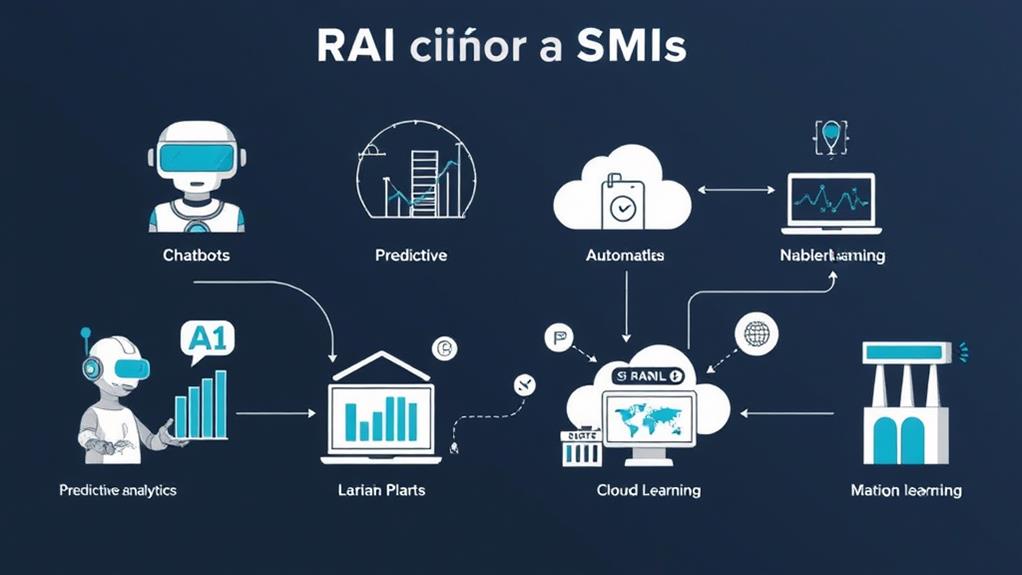The Role of AI in SMB Digital Transformation
AI considerably influences the digital transformation of small and medium-sized businesses (SMBs) by driving operational efficiency and enhancing customer engagement. Utilizing AI technologies like predictive analytics and automation tools, SMBs can streamline workflows and make informed decisions based on real-time insights. Personalized marketing strategies foster stronger customer connections and loyalty, while data analytics uncover actionable insights from vast datasets. Additionally, adopting AI facilitates scalability and improves overall agility. As SMBs navigate these changes, understanding the implications and potential of AI will be essential for sustaining growth in a competitive landscape. Explore further to uncover the full spectrum of AI's impact.
Key Takeaways
- AI enhances operational efficiency for SMBs by automating tasks and streamlining workflows, reducing costs and freeing up resources for strategic initiatives.
- Predictive analytics through AI allows SMBs to make informed decisions by analyzing historical data and forecasting future trends and needs.
- Personalized marketing powered by AI improves customer engagement, delivering tailored recommendations and enhancing overall satisfaction and loyalty.
- AI technologies facilitate real-time data analytics, enabling SMBs to identify performance issues promptly and uncover cost-saving opportunities.
- Integration of AI fosters a culture of innovation within SMBs, helping them adapt quickly to market changes and stay competitive.
Understanding Digital Transformation

Digital transformation has become a pivotal process for small and medium-sized businesses (SMBs) seeking to enhance their operational efficiency and customer engagement. In a rapidly evolving digital landscape, SMBs are confronted with the necessity of achieving digital maturity through strategic technology adoption. This journey involves not just the implementation of new tools but an overarching shift in business mindset and culture.
Understanding digital transformation entails recognizing its multi-faceted nature. It is not merely about adopting the latest technology; it requires an alignment of people, processes, and technology to create value. For SMBs, this transformation is essential for staying competitive and responsive in a marketplace that demands agility and innovation.
A focus on digital maturity enables these businesses to assess their current capabilities, identify gaps, and systematically incorporate technologies that foster growth and efficiency.
Moreover, technology adoption plays a critical role in this transformative process. It encompasses evaluating solutions that address specific business needs, whether that be cloud computing, customer relationship management systems, or data analytics tools.
However, it is essential for SMBs to approach adoption with a clear understanding of their objectives and operational realities.
Benefits of AI for SMBs
The integration of AI into small and medium-sized businesses (SMBs) presents significant advantages that can transform decision-making processes and drive cost efficiencies.
By harnessing data analytics and predictive modeling, SMBs can make informed strategic choices that enhance operational agility.
In addition, the automation of routine tasks not only reduces expenses but also allows teams to focus on more value-added activities, ultimately fostering growth and innovation.
Enhanced Decision-Making Processes
Harnessing the power of artificial intelligence empowers small and medium-sized businesses (SMBs) to enhance their decision-making processes considerably. By integrating predictive analytics, SMBs can examine historical data to identify trends, enabling intelligent forecasting that anticipates customer needs and market shifts. This proactive approach fosters adaptive strategies that enhance overall performance optimization.
Additionally, AI-driven collaborative filtering provides personalized recommendations that resonate with target audiences, bolstering customer engagement and satisfaction. Utilizing sentiment analysis allows businesses to gauge customer emotions, informing real-time insights that drive strategic adjustments in marketing and product development.
Effective risk assessment becomes more attainable through scenario planning, where AI models various outcomes based on changing variables. This enables SMBs to prepare for uncertainties with greater confidence. Furthermore, the capacity for trend identification aids in forecasting competitive shifts, ensuring timely resource allocation.
In this rapidly evolving business landscape, the ability to leverage AI for improved decision-making not only enhances operational agility but also empowers SMBs to navigate complexities with informed clarity.
Investing in these intelligent systems ultimately positions SMBs to seize opportunities and thrive in an increasingly competitive arena.
Cost Reduction Opportunities
Cost efficiency emerges as an essential advantage for small and medium-sized businesses (SMBs) implementing artificial intelligence technologies. By leveraging AI, SMBs can access significant cost reduction opportunities that enhance overall operational efficiency.
Through accurate cost analysis and optimized resource allocation, businesses can make informed decisions that result in effective budget optimization and streamlined expense management.
Key benefits of AI in cost reduction include:
- Financial Forecasting: AI algorithms provide insights into future expenditures and income, enabling precise financial planning.
- Productivity Enhancement: Automation of repetitive tasks frees up valuable human resources, allowing staff to focus on strategic initiatives.
- Process Simplification: AI-driven systems can analyze and refine workflows, reducing redundancies and lowering operational costs.
- Real-Time Analytics: Constant assessment of performance metrics helps in identifying areas for further cost savings.
In today's competitive landscape, the integration of AI not only aids in expense management but also fosters a culture of innovation and agility.
Key AI Technologies for SMBs

In the domain of digital transformation, small and medium-sized businesses (SMBs) can harness key AI technologies to drive efficiency and profitability.
Machine learning applications, automation tools, and data analytics are not mere trends; they represent strategic assets that can reveal valuable insights and optimize operations.
Machine Learning Applications
Machine learning has emerged as a pivotal technology for small and medium-sized businesses (SMBs), enabling them to access invaluable insights from their data. This capability not only enhances decision-making but also drives efficiency and productivity across various operations.
By leveraging machine learning, SMBs can harness the power of predictive analytics and transform their business strategies.
Consider the following applications of machine learning that can considerably benefit SMBs:
- Predictive analytics for sales forecasting, helping businesses anticipate demand.
- Personalized marketing initiatives to improve customer engagement and satisfaction.
- Fraud detection systems that safeguard against financial losses.
- Inventory management optimizations that minimize costs and reduce waste.
Furthermore, machine learning aids in customer segmentation, risk assessment, and sentiment analysis, allowing SMBs to better understand their target markets.
By adopting these technologies, businesses can enhance employee productivity and optimize supply chain operations, leading to a competitive edge in today's dynamic marketplace.
Embracing machine learning not only empowers SMBs to fulfil their immediate operational needs but also secures their long-term growth and sustainability in an increasingly digital landscape.
Automation Tools Benefits
Automation tools have become essential assets for small and medium-sized businesses (SMBs) looking to streamline operations and enhance overall efficiency. These technologies enable SMBs to optimize workflows, reduce human error, and increase productivity, allowing teams to focus on strategic initiatives rather than mundane tasks.
By leveraging automation, businesses can achieve significant workflow optimization, ensuring that processes are executed smoothly and efficiently. The benefits extend to improved time management; with routine tasks delegated to automated systems, employees can allocate time to higher-value activities. This not only fosters innovation but cultivates a more agile work environment where creativity thrives.
Additionally, automation tools provide scalability, allowing SMBs to grow without the proportional increase in operational overhead. The integration of these tools empowers SMBs to remain competitive, especially in a fast-paced digital landscape.
By embracing automation, they can enhance customer experiences through faster response times and more personalized services. The freedom gained from reduced manual workloads enables SMBs to adapt quickly to market changes, fostering resilience.
As SMBs continue on their digital transformation journey, the strategic adoption of automation tools will be key to revealing their full potential.
Data Analytics Insights
Releasing the potential of data analytics is essential for small and medium-sized businesses (SMBs) working to thrive in today's competitive market. By harnessing key AI technologies, SMBs can transform raw data into actionable insights that drive strategic decisions.
Two pivotal concepts within this domain are data visualization techniques and predictive analytics models. These tools empower businesses to not only interpret complex datasets efficiently but also anticipate future trends and behaviors.
The integration of AI in data analytics offers numerous advantages for SMBs:
- Enhanced decision-making through real-time insights
- Improved customer understanding and segmentation
- Streamlined operations with data-driven recommendations
- Increased competitive advantage by identifying market trends
Enhancing Customer Experiences
In today's competitive landscape, enhancing customer experiences stands as a vital concern for small and medium-sized businesses (SMBs), especially as they navigate the complexities of digital transformation. Utilizing AI-driven solutions, SMBs can leverage personalized marketing strategies that cater to the unique preferences of their clientele. By harnessing customer insights through advanced data analytics, businesses are equipped to craft tailored campaigns that greatly boost user engagement.
Furthermore, feedback analysis plays an essential role in understanding customer sentiments and improving service offerings. Implementing service automation tools allows SMBs to streamline responses, fostering seamless interactions that enhance the overall customer journey.
Experience optimization can be achieved through effective journey mapping, guaranteeing that each touchpoint resonates with the customer's expectations. Loyalty programs, powered by AI, can identify and reward repeat customers, promoting retention and long-term satisfaction.
With the integration of satisfaction metrics, businesses can continuously monitor and refine their approaches, responding adeptly to emerging trends and customer preferences. Ultimately, embracing AI in enhancing customer experiences empowers SMBs to cultivate deeper connections with their audience.
These transformative tools not only refine operational efficiencies but also pave the way for an adaptable business model that thrives in a digital-first world. By prioritizing customer-centric strategies, SMBs can guarantee they not only survive but flourish amidst the challenges of an ever-evolving marketplace.
Streamlining Operations With AI

Leveraging artificial intelligence, small and medium-sized businesses (SMBs) can greatly streamline their operations, leading to improved efficiencies and reduced costs. By implementing AI-driven solutions, SMBs can achieve a level of operational efficiency that enhances both productivity and profitability.
The integration of AI facilitates workflow enhancement across various business functions, thereby enabling more effective resource management.
To illustrate the transformative impact of AI on operational processes, consider the following key areas:
- Task Automation: Automating repetitive tasks allows employees to focus on more strategic initiatives, elevating job satisfaction and productivity.
- Performance Tracking: AI tools can analyze real-time data, providing valuable insights that lead to informed decision-making and timely interventions.
- Inventory Management: AI algorithms predict inventory needs with remarkable accuracy, minimizing waste and ensuring ideal stock levels.
- Quality Assurance: AI systems monitor product quality continuously, reducing defects and improving customer satisfaction.
The implementation of these AI technologies not only fosters process improvement but also enhances communication among team members.
Effective project coordination is achieved through streamlined communication channels, allowing for immediate feedback and agile adjustments.
Ultimately, the strategic use of AI empowers SMBs to eliminate inefficiencies and respond dynamically to market demands, paving the way for sustained growth and innovation.
Data-Driven Decision Making
A significant number of small and medium-sized businesses (SMBs) are now harnessing data-driven decision-making to enhance their strategic outcomes and competitive positioning. By leveraging predictive analytics, these organizations gain invaluable real-time insights into market trends and customer behaviors, which are vital for informed decision-making. This shift toward data-centric strategies enables SMBs to respond proactively to fluctuations in demand and optimize their offerings accordingly.
Data visualization tools further facilitate this process by transforming complex data sets into intuitive graphical representations. Such visual aids empower decision-makers to quickly identify key performance metrics and uncover patterns that may otherwise remain hidden.
Business intelligence platforms consolidate diverse data sources, allowing for effective customer segmentation and deeper understanding of target markets. This enhances an SMB's ability to tailor marketing efforts and refine product development, ultimately aligning with customer expectations.
Moreover, advanced market forecasting techniques enable SMBs to anticipate changes in consumer preferences and adjust strategies preemptively. This agility is essential in fostering operational efficiency, as businesses become better equipped to allocate resources effectively and minimize waste.
The integration of data-driven decision-making into their operational frameworks allows SMBs not just to survive but to thrive in an increasingly competitive environment.
Overcoming Implementation Challenges

Many SMBs encounter significant hurdles when attempting to implement digital transformation initiatives, particularly in the domain of adopting AI technologies. The road to successful implementation is oftentimes blocked by critical challenges that require strategic solutions. Addressing these hurdles demands effective change management strategies and robust planning.
To facilitate a smoother shift, consider the following approaches:
- Employee Training Programs: Invest in thorough training initiatives to guarantee that staff is equipped to navigate new AI tools effectively. This reduces resistance to innovation.
- Stakeholder Engagement Tactics: Engage key stakeholders early in the process to cultivate a sense of ownership and align organizational goals with digital initiatives.
- Integration Complexity Solutions: Employ technologies and methodologies that enhance system interoperability, minimizing integration complexity and improving user experience focus.
- Vendor Selection Criteria: Define clear criteria that prioritize scalability considerations and strength of support, making sure that the chosen technology provider meets both current and future needs.
Furthermore, budget allocation challenges can arise as organizations grapple with the costs associated with these transformations. Balancing these financial concerns with the potential ROI requires careful analysis.
Future Trends in AI for SMBs
The landscape of artificial intelligence is evolving rapidly, and small to medium-sized businesses (SMBs) stand to gain considerably from emerging trends. AI advancements are set to redefine competitive advantages, as SMBs harness predictive analytics for data-driven decision-making. By leveraging predictive models, businesses can anticipate customer needs, enabling personalized marketing approaches that resonate with individual preferences.
Additionally, ethical considerations around AI deployment are becoming increasingly important. SMBs must prioritize transparency and accountability in their AI strategies to maintain customer trust and compliance with regulations. This involves implementing industry-specific solutions that address unique challenges while considering ethical implications.
As AI technology continues to mature, integrating emerging technologies will become essential. Businesses will benefit from effective integration strategies that align AI initiatives with existing workflows, enhancing operational efficiency.
Furthermore, scalability options in AI solutions allow SMBs to expand their capabilities without significant overhead, guaranteeing that growth can be sustained over time.
Employee training will also play a significant role in this transformation. By equipping staff with the necessary skills to utilize AI tools effectively, SMBs can foster a culture of innovation and adaptability.
To summarize, the future of AI in SMBs is promising, characterized by strategic advancements that not only drive profitability but also uphold ethical practices and industry relevance, solidifying their place in an increasingly competitive marketplace. Embracing these trends will empower SMBs to transform challenges into opportunities, securing a resilient future in the digital economy.
Frequently Asked Questions
How Can SMBS Start Integrating AI Into Their Existing Processes?
To effectively integrate AI into existing processes, SMBs should begin by identifying key AI integration strategies that align with their business goals.
This involves evaluating process automation opportunities, such as automating routine tasks to enhance efficiency and reduce costs.
Subsequently, investing in training and development will empower employees to leverage AI tools effectively.
What Skills Are Needed for Employees to Work With AI Technologies?
A recent report indicates that 85% of jobs will require employees to possess proficiency in AI technologies by 2025.
To effectively engage with AI tools, employees must develop key skills including data literacy and technical proficiency.
Additionally, they should enhance critical thinking and collaborative skills to interpret AI outputs meaningfully.
Ethical considerations are critical in technology use, while adaptability training guarantees resilience in evolving job landscapes, highlighting the need for diverse skill sets in today's workforce.
Are There Specific AI Tools Designed for Different Industries?
Indeed, there are various AI tools specifically designed for different industries, offering industry-specific applications that enhance operational efficiencies.
These tailored AI solutions empower organizations to address unique challenges, whether in healthcare, finance, or manufacturing.
By leveraging specialized tools, businesses can harness the full potential of artificial intelligence, driving innovation and competitive advantage while allowing the workforce to focus on strategic initiatives.
Such adaptability fosters an environment allowing flexibility and growth in diverse sectors.
How Can SMBS Measure the Success of AI Implementation?
To measure the success of AI implementation, SMBs can analyze specific success metrics and performance indicators.
For instance, a hypothetical retail company employing AI-driven inventory management could evaluate its success by monitoring stock turnover rates and customer satisfaction scores. Enhanced operational efficiency and improved sales figures would indicate positive outcomes.
What Are Common Misconceptions About AI in Small Businesses?
Common misconceptions about AI often revolve around AI myths, such as the belief that it is prohibitively expensive for small businesses or that its complexity is insurmountable.
In reality, AI affordability has improved considerably, making it accessible to a wider range of enterprises.
Additionally, concerns regarding AI security often stem from misunderstandings about its implementation.
Conclusion
To sum up, the integration of artificial intelligence into the fabric of small and medium-sized businesses heralds a transformative wave, akin to the dawn breaking over a previously uncharted horizon. By harnessing AI's capabilities, SMBs can not only enhance operational efficiency but also foster meaningful customer relationships and make informed decisions driven by data insights. The journey towards digital transformation, while fraught with challenges, ultimately offers a pathway to sustainable growth and competitive advantage in an increasingly digital marketplace.



